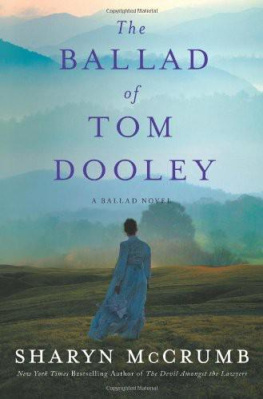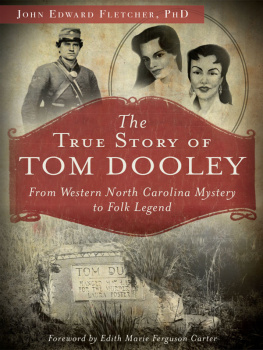
Sharyn McCrumb
The Ballad of Tom Dooley
The ninth book in the Ballad series, 2011
To Wilkes Countys Keepers of the Legends, especially Edith Ferguson Carter, Zelotese Walsh, Randy Joyner, Shannan Roark, Julie Mullis, and Christy Earp
What did I know about murder cases that a mans life should lie in my hands? I had spent the whole of my adult life in politics, except for a few years on a mountain circuit court, a decade before that trial. A war ago.
This tale is not a penny-dreadful thriller, penned by the likes of Mr. Wilkie Collins. Look elsewhere for clues and footprints and the trappings of a puzzle story-and go to the devil if you try to make this tale into one.
A case of law is a chess game for those who make their living at it, and a great sorrow for those who get caught up in its web.
A man died bravely, doing perhaps the only noble thing he ever achieved in his brutal, useless life. Another fifty years of living would not have improved him, for he had only a minutes worth of courage, and he spent that.
That is the burden of this story, and it would shine brighter if there were a good woman at hand with the heart and the wit to tell it well. But we have no good woman to speak out for the doomed man-only a vain and selfish ditch rose, who rightly feared for her own life, and a raddled slut who delighted in the destruction she wrought single-handed. One of those wretched women is also my client, for the pair was arrested together, and bound over to stand trial for the same crime, but I had deemed it better for all concerned that they be tried separately for this deed, and I vowed to ask for severance as soon as I was able.
The young soldier was the first to face the judge, and it was he that I was concerned with at the outset. I would do what I could for him.
People will tell this story for a century, though Im damned if I know why. Theres little enough to it. No doubt they will sing about it, and spin fanciful tales, and act it out, turning all its principals into Sunday-school sweethearts and black-hearted villains. It will all be nonsense. At least I remember what was real.
I remember.
***
I am weary and garrulous in my old age, sitting by the fire in my fine Washington home, and thinking back twenty-odd years, to when I was domiciled here in the old Capitol Prison, instead of in the United States Senate, where I have been nigh on ever since. I have been paging through my personal papers, idly speculating about whether I should like to write my memoirs someday. They would make interesting reading, though I do say so myself. One might trace my progress from backwoods farm boy to country lawyer, to Congressman, and then to Colonel of the 26th North Carolina during the War. I saw action on the front lines in Virginia. That was about as much soldiering as I cared to experience, so when the opportunity arose, I got myself elected Governor. From the Governors Palace in Raleigh, I sat out the remainder of the hostilities, skirmishing with bureaucrats and trying to protect the people of my state from both armies. They clapped me in prison here in Washington at the Wars end, for my trouble, but I didnt take it personally-all the governors were there, so I did not lack for society. In a few weeks, they let us all out again, and I went home to a state made so desolate by war that my own personal ruin hardly mattered. I began again.
I had to practice a little law after the War ended, before those same trifling government bureaucrats saw fit to let me back into the congress I had unwillingly left when my home state seceded. I do not mean to ever leave Congress again. I shall die here, protecting the interests of my fellow Tarheels for as long as God grants me breath and strength.
A fine row house in the District of Columbia city is a far cry from my birthplace-a log cabin in the Carolina backcountry-but from my boyhood I could see my way clear to getting here as surely as I could see that blue haze of mountains that walled us off from the state of Tennessee. I come of good stock, though you might not think it, for we looked no more prosperous or cultured than most of our frontier neighbors, but my fathers father had fought in the Revolution. He wintered at Valley Forge with General Washington, and fought alongside him at Brandywine, Germantown, and Monmouth. I am proudest, though, of the fact that he fought closer to home-at Kings Mountain on the South Carolina border, just west of Charlotte. In 1780 a group of backcountry volunteers, calling themselves The Overmountain Men, engaged the British forces there, and defeated them in an hour, killing their commander, and proving that untrained colonials could defeat the mighty British army. George Washingtons troops were losing the War to the north, and that little victory on a Carolina hillside proved to the rest of the country that winning was possible. It was the turning point of the War, and I was proud that my family had been part of it.
On that little mountain farm where I grew up, we plowed furrows, and slopped hogs, and hewed firewood, but we were never allowed to forget that we were destined for greater things. My grandfather had left a library of five hundred books, and my mother read to us each night when the chores were done. My father died young, though, and so the way to prosperity was a steep and thorny path for us. I got some schooling over in Tennessee at Washington College, so that I had the rudiments of Latin, and composition, debate, and ancient history, but my fathers death ended that idyll, and before long I was clerking in a fine resort hotel in Warm Springs. That, too, was an education, though. It was a zoo for the aristocracy, and I learned to pass muster as one of them.
I read law in Asheville, and then begged and borrowed the funds to take me to the University of North Carolina for the formal study of law. I meant to get elected to something before long, and so I did, but for a few years in my youth I practiced law on the circuit court out of Asheville. There was little in those experiences worth mentioning in a senators memoirs.
But this Wilkes County case That came later in my career, and in it, I was defending a man on trial for his life. I had thought of including the tale in my memoirs, because it became quite a celebrated trial. The New York Herald even sent a reporter down to cover it. But the public finds it hard to recognize success or skill if one ultimately loses the case, so perhaps I will not include it, after all. I have had enough adventures for two lifetimes, without telling that sad little tale.
That Wilkes County court case constituted my brief hiatus from public life, falling in 1866, when, having been the Confederate Governor of North Carolina, I was barred from running for public office yet awhile, so, when they let me out of Capitol Prison with the rest of the Rebel governors, I bided my time and supported Harriette and the boys by returning to the practice of law. Perhaps I thought that my renown and popularity would make up for any deficiencies I might have in my long-disused courtroom skills.
The law was never much more than a means to an end for me, anyhow. I was always happy to help people escape what was coming to them, which is mostly what a defense attorney does, but from the very beginning I was only marking time until I got elected to something. But for the War, I would have never looked back.
***
A frail girl was stabbed to death in the foothills of Wilkes County, and nigh on everybody there knows who did it. Well, I didnt know. I was practicing law in Charlotte, some ninety miles away, and I was only called in to defend the man they had arrested, a complete stranger to me, despite what people have said to the contrary over the years. He was a Confederate veteran, as was I, but we never served together, and would not have been acquainted even if we had, for I began and ended my military service as a colonel, and he stayed a sickly private and a drummer boy. We were worlds apart, except perhaps to people who looked at our lives on paper.
Next page



